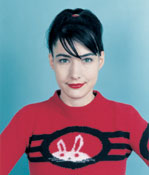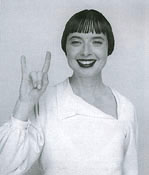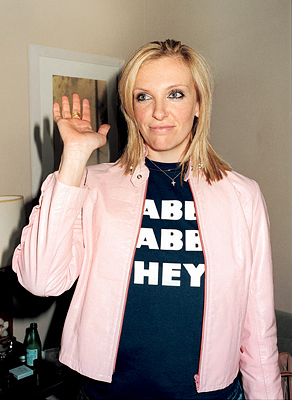 |
  |
 |
  |
 |
 |
| |

Read Bjork's2001 interview with Juergen Teller from the index archives. |

|
 |

Kathleen Hanna discusses writing and making music in this interview from 2000 with Laurie Weeks. |
|
 |
|
 |
|
|
 |

Isabella Rossellini spoke with Peter Halley in this 1999 interview. |
|
 |
|
|
 |
 |
|
Alexander McQueen's 2003 interview with Bjork. |
|
 |
|
|
 |
|

|
| Toni Collette, 2003
WITH ARIANA SPEYER
PHOTOGRAPHED BY LEETA HARDING |

Toni Collette meditates in Tibet. she surfs. she runs a film company in Sydney.
She plays sad sacks who somehow come out on top.
Starting with her role as a hapless video store clerk in Muriel's wedding, through her turn as a suicidal single mom in About a boy, Collette has pinpointed painful truths with genius Comic timing.
ARIANA: Working on Velvet Goldmine in 1997 with Todd Haynes must have been an intense experience.
TONI:: We were filming in London, where I knew a lot of people. But I didn't see anybody. I was in a Velvet Goldmine bubble.
ARIANA: But I'm sure you feel that way about a lot of films.
TONI:: No, it's rare. I've remained friends with a lot of the people who worked on it. It was a story about people who pushed the limits, and we did that too. We all felt superhuman. It was very sad when it ended.
ARIANA: That film completely captures the decadence and despondence of the David Bowie London of the '70s.
TONI:: I was covered in glitter the whole time. I still have glitter in certain places.
ARIANA: Were you disappointed that the movie wasn't very well received?
TONI:: The people who sell a movie can really fuck it up. I learned that with Velvet Goldmine. Miramax didn't give a shit, and they really let it fall away. I know it's a strange film, but I think Todd is a genius.
ARIANA: How did he react to the movie's reception?
TONI:: Todd's one of those directors that doesn't give a shit about how his films are received. He's simply telling the story that he needs to tell. Because he wrote the script and his vision was so clear, he was really able to influence my performance.
ARIANA: That's usually part of the director's job description.
TONI:: I know! I said a terrible thing to a director recently. He had asked me what I look for in a director, and I said, "Somebody who knows when to back off, because I'm going to do what I want to do." Unless I'm way off the mark, or the director has also written the script, I can't be influenced.
ARIANA: You first went to Hollywood in 1994 after making Muriel's Wedding. You were thrust into the publicity juggernaut.
TONI:: When we were filming Muriel's Wedding I didn't even contemplate the fact that people would watch it. So I really wasn't prepared for what came afterwards. I traveled alone all over America and Europe and fucking sold that movie for a year. I was thrown into the deep end, and I had no idea what to expect.
ARIANA: And you were just twenty-one.
TONI:: Yeah. I didn't feel comfortable being defined. I still don't. Everybody is so much more than you think they are. It's fucked that people fall into the trap of becoming
their jobs.
ARIANA: Then you were in big American movies like Shaft, Changing Lanes, and About a Boy.
TONI:: The part about movies that interests me is making them, and that's the same the world over. It's just that different directors create different atmospheres. But in America a movie is considered good if it earns a lot of money. That's really dangerous. Everything is flipped around here.
ARIANA: Yeah, it's kind of backwards.
TONI:: I find it really weird that in Hollywood, actors are signed on to films before directors. At the moment, I'm looking at a script that I like, and there is an actress attached to it that I really admire. But there is no director, so how can I say yes? I don't know whom I'd be working with. I would just like to remind everyone that "Star A plus Star B" doesn't always get you an explosive film. It's originality and creativity that appeal to people.
ARIANA: Films made in Australia have different priorities?
TONI:: We have no big studios, no formulas, and there aren't many stars. Muriel's Wedding got tremendous attention, but Rachel Griffiths and I were completely unknown at the time.
ARIANA: Back in Sydney, I understand you have your own production company.
TONI:: Yep — Figurehead Films. I started it with a good friend of mine, Sally Chesher. At the moment we're developing a script called Razor, about Australia in the late '20s. You couldn't carry guns back then, so everyone had blades, and people were just slashed to death in back allies. Two women led the Sydney gangs — they kind of ruled the roost.
ARIANA: Wow, what a great story.
TONI:: It is rare to find characters like these. We're really excited. And I'm learning a lot, coming in at a completely different point in the filmmaking process. I'll be acting in it as well. To put it very bluntly, I earn more money in America, but if I could work at home all the time, I probably would.
ARIANA: Your newest movie is called Japanese Story. Despite the name, it takes place in the Australian desert, the Pilbara. You play an overworked geologist who guides a mysterious Japanese businessman, played by Gotaro Tsunashima, to remote iron mines. The desert landscape is such a strong presence that it's almost like another character.
TONI:: Even though the desert seems completely desolate, there's a lot going on.
ARIANA: It looked a little dangerous, like the frontier.
TONI:: The underbelly of the desert is amazing. In the little mining towns where we stayed, there were the stereotypical, blokey guys in shorts and tank tops, and lots of topless bars. Crazy shit. It can be scary out there, but it was always beautiful. It was actually a very safe way of visiting that part of the world, because I was surrounded by a film crew. At one point my husband came to visit and
we went camping.
ARIANA: Do you go camping often?
TONI:: Yeah. I actually have a swag. It's a portable canvas cover for your sleeping bag,
so you don't need a tent. You can see the sky, which is the beauty of sleeping outside.
ARIANA: I know you also do meditation.
TONI:: I really got into it when I was shooting The Sixth Sense in Philadelphia. I had just gone through a bad break-up, and I had space and time to myself. Acting is a form of meditation for me. It feels best when I'm not even aware of what I'm doing — I'm out of the way and things are just happening.
ARIANA: If your acting is any indication, you're probably very good at meditation.
TONI:: I'm good at focusing. Sometimes I choose the wrong things to focus on — but when I apply myself, I am good at meditating. Once I even had an orgasm meditating. It completely came out of nowhere. I was at my parents' place in Sydney, and I had just come back from shooting. My whole family got up and went to work. I sat in the middle of the living room and started meditating, and then, holy cow, there it was. It hasn't happened since. Not that I haven't tried. [laughs]
ARIANA: So that's why you're so interested in Tibetan Buddhism. [laughs]
TONI:: I do want to go back to Tibet. Once, when I was there with a handful of people, we met a yogini who has been in retreat for fifty years. She lives near a mountain village far away from Lhasa. I've never been anywhere that's so untouched. A river runs right by the village, and on the river's edge are hot spring fissures. They're supposed to be the most healing natural springs in the world. We walked through the snow up the mountain to see this yogini — we were above the clouds. We were told that she doesn't come out at all — not for her followers, not for anybody. But she ended up spending three hours with us. She totally focused on me and gave me my own mantras. She had never seen a camera before, but she took ours and snapped photos of all of us, laughing her head off.
It was life changing.
ARIANA: You recently bought your own home in Sydney. Are you becoming more settled?
TONI:: Yes. After Velvet Goldmine, I was literally working on films back to back, all over the place for years.
ARIANA: It's so crazy — you've already made around twenty-five films.
TONI:: Just the other day I was trying to remember how many films I've done. My life now is more stable, and I'm trying to travel less. I'm sick of traveling for work because that really affects your perceptions of a place. It's almost as if someone is taking away
something that you want to keep for yourself.
ARIANA: Your marriage in January must be playing a part in your new domesticity.
TONI:: I married the most beautiful human being on the planet. I used to be a person who had to fill every gap. Now I love just staying at home and doing nothing all day.
|
|
 |
|
|
 |

©
index magazine
Toni Collette by Leeta Harding, 2003 |
|
 |
| |
|
|
|
 |
 |
|
Copyright © 2008 index Magazine and index Worldwide. All rights reserved.
Site Design: Teddy Blanks. All photos by index photographers: Leeta Harding,
Richard Kern, David Ortega, Ryan McGinley, Terry Richardson, and Juergen Teller |
| |